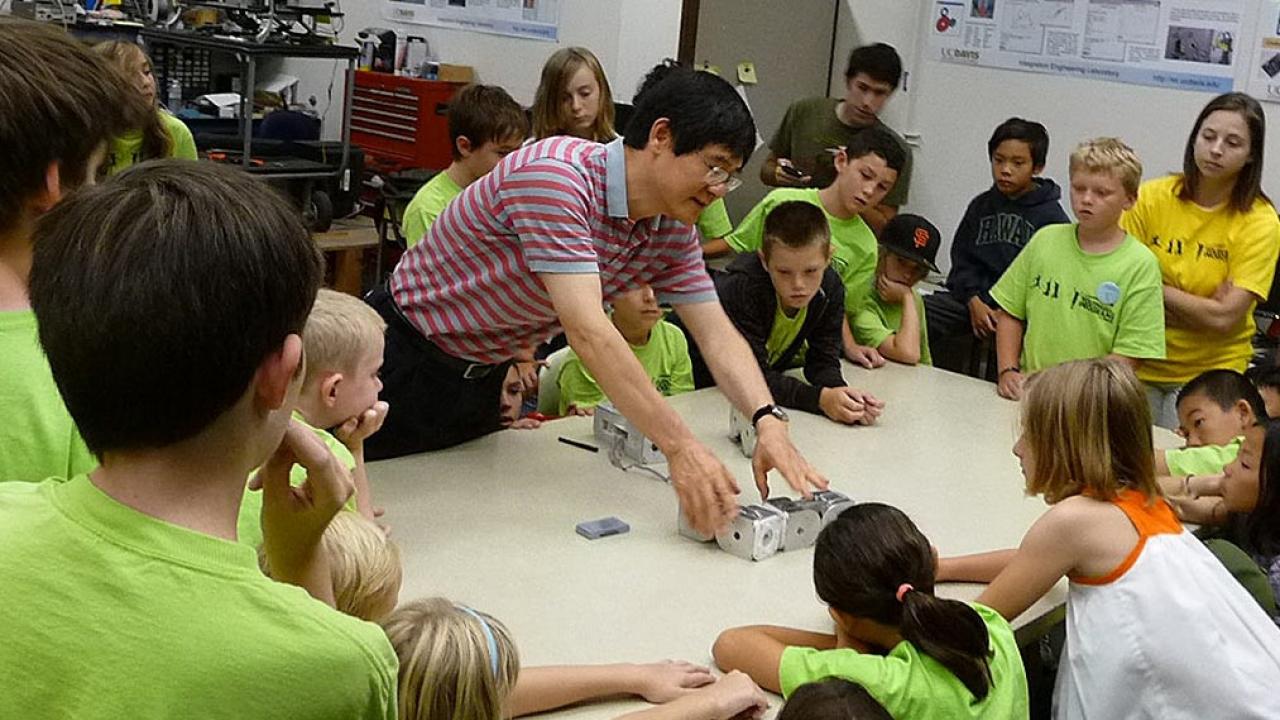
Harry Cheng: Making Math and Engineering Accessible to All
By Rachel Steere, originally posted by UC Davis Engineering.
Harry Cheng is a professor in the UC Davis Department of Mechanical and Aerospace Engineering and is the founder and director of the C-STEM (Computing, Science, Technology, Engineering and Mathematics) Center.
The C-STEM Center develops computing technology, curriculum and educational strategies, and provides professional development and support for STEM teachers. These efforts extend to teachers without any prior coding and robotics experience to provide equitable access to integrating hands-on computing and robotics into classroom teaching. The curriculum provides K-12 students with up to 13 years of integrated learning of math and computer science. The center is a UC Approved Educational Preparation Program for Undergraduate Admission for both K-12 and community college students to all UC campuses.
“For the last decade my research has really focused on how to develop robotic assistance for educational use and curriculum,” said Cheng. “I provide professional development because math is one of the most critical areas for student learning in K-12 and it is very important for the STEM field.”
Cheng started the center in 2010 after he reached out to the local school district to bring coding into their classrooms, but realized so many students were struggling in math. He saw there was a bigger challenge and suggested an engineering approach to change the way math was being taught.
“Instead of using pencil and paper to teach math, I introduced an engaging way to use coding and robotics for a more hands-on learning approach to learn math concepts and solve real world problems,” said Cheng.
The C-STEM Center continues to grow and many schools and districts nationwide are now adopting the curriculum. The center also continues to provide many free teaching resources so more schools can have access to the program.
“When teachers and school administrators tell me our program has created a miracle for their students who are struggling and that their grades have improved, they now love math and talk about math, and they want to come to math class and stay longer to do their homework, it makes me so happy to hear that,” said Cheng.
In addition to curriculum for K-12 students, the center holds extracurricular activities such as the RoboPlay Competition, which is a level-playing-field competition based on a student’s ability and Girls in Robotics Leadership, or GIRL, camps in which middle and high school girls are inspired to pursue careers in the STEM field and become leaders. These activities are recognized in the UC admissions process as achievements that have explicitly prepared students for college.
“In order to have diversity, equity and inclusion in our education systems, we have to start with the students when they are young and help those from underrepresented groups pass crucial classes,” said Cheng. “Math and algebra need to be the gateway to their success rather than a gatekeeper to the STEM field.”
Cheng says he believes that as a university we have an obligation to address these challenges and provide an equal education to all people in California. He says we need to do our share and use our expertise to create a better society and address the diversity, equity and inclusion issues in collaboration with our K-12 partners.
“In the U.S. and in California, less than 40 percent of students meet or exceed math standards. Our K-12 math education system has failed our students, especially the students from the underrepresented minority groups,” said Cheng. “By changing the way math is taught in the K-12 education system, we can give students new hope to be able to learn math with hands-on learning, coding and robotics in a more engaging way. This is the most fulfilling part of my work and it is changing student’s lives for the better.”
